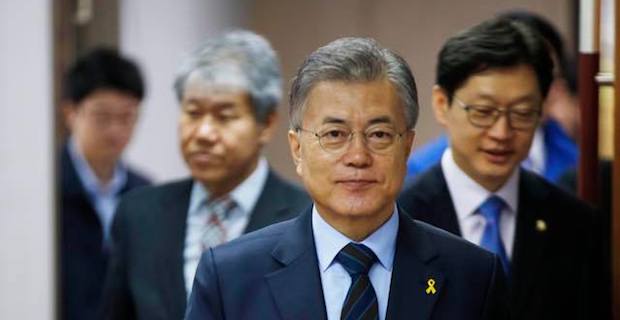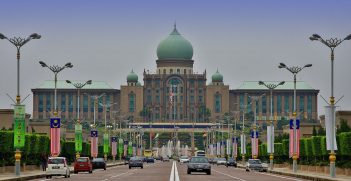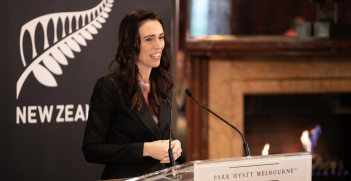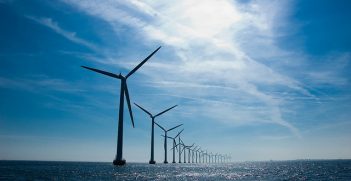Moon's Rise Offers New Opportunity for Australia

The new South Korean President Moon Jae-in has been sworn in and is expected to bring significant change to the country’s domestic and international affairs. It’s an opportunity for Australia to enhance the bilateral relationship by leveraging its peculiar status in Korea.
On 9 May, South Koreans took to the polls in record numbers to elect Moon Jae-in as president. Benefitting from his opposition to impeached former President Park Geun-hye, Moon took an early lead in the polls. He ran a careful campaign focused on domestic economic issues and maintained his lead throughout the election. For many South Koreans, his victory represents the culmination of a tumultuous political period and expresses their hopes for a return to normality.
Moon is the embodiment of South Korea’s progressive centre-left tradition. He played a role in the democratisation struggle, worked as a human rights lawyer, and was professionally and politically associated with former President Roh Moo-Hyun. While the election schedule limited more detailed policy debate, Moon’s core domestic and international priorities are well-known.
Moon’s international agenda calls for principled re-engagement with North Korea. This potentially includes re-opening the Mt. Geumgang Tourism Project, the Gaeseong Industrial Complex, and seeking direct talks with North Korea. Moon also criticised the previous administration’s decision to deploy Terminal High-Altitude Area Defense (THAAD) as rushed and undemocratic. This implies reviewing and potentially rescinding the decision to deploy THAAD, a move that would improve relations with China and potentially lead to a relaxation of economic sanctions on the tourism, entertainment and retail sectors.
Moon’s domestic agenda calls for tax reform, chaebol (conglomerate) reform, gender equality and women’s empowerment, education reform, improving working conditions and job security, addressing youth unemployment and expanding the civil service to address general unemployment. These policies broadly respond to public concerns regarding declining standards of living, corruption, lack of political representation and intergenerational inequality—given the label ‘Hell Joseon’ in reference to the dynasties of imperial Korea when Confucian hierarchies entrenched social immobility.
Australia’s role
It seems natural to assume that Australia would fit into Moon’s international agenda. South Korea is likely to seek international and regional support for initiatives to re-engage North Korea. During the Sunshine Policy under Kim Dae-jung and Roh Moo-hyun, South Korea actively engaged and encouraged regional partners to support the initiative.
Sunshine 2.0, or Sunshine Rebooted, demands Australia’s attention. Australia has an interest in Korean Peninsula security and stability, the maintenance of the US presence and alliance network in East Asia, and the strengthening of bilateral economic, political and security relations. However, thinking about an Australian role in Moon’s efforts to re-engage North Korea at this early stage jumps the gun. There is a settling-in period for any new administration. Further, any efforts to re-engage North Korea must await more conducive geopolitical environment. Finally, with no party holding a clear majority and the next general election scheduled for April 2020, without reorganisation the new administration will struggle to pass legislation.
Most importantly, thinking about an Australian role also commits the Korean Peninsula analyst’s cardinal sin of thinking about North Korea before South Korea. Australia must continually assess options to support Moon’s international objectives, but it can make an earlier and substantially greater impact by leveraging its economic credentials to support Moon’s domestic objectives.
Hating Korea
At the heart of Moon’s victory lies the implicit promise to address the sense of general malaise associated with Hell Joseon. For many South Koreans, Australia appears as the polar opposite to Hell Joseon. This is backed by popular culture and statistics. Australia acts as a largely absent but idyllic immigration destination for a young woman dissatisfied with life in South Korea in Jang Gang-myung’s best-selling and hugely popular novel Because I Hate Korea (2015). A year after its release, Australia was ranked second in the OECD’s Better Life Index, compared to South Korea’s 28th. For all intents and purposes, Australia appears to have overcome many of the challenges that drove South Korean voters to elect Moon Jae-in. This presents an opportunity for Australia.
An active and early campaign to engage South Korea on domestic economic issues could prove beneficial to the Australia-Korea relationship. Efforts to improve research cooperation, policy interaction, and knowledge sharing on issues as diverse as standards of living, corruption mitigation, political representation, or intergenerational inequality would add to the value of the bilateral relationship.
Over the past 10 years, Australia successfully broadened the bilateral relationship beyond the narrow focus on economics that has characterised it since the 1970s. This included the establishment of annual 2+2 defence and foreign minister meetings, the signing of the 2009 Memorandum of Understanding on Development Cooperation, the Joint Statement of the 2010 Korea-Australia Dialogue and the 2015 Blueprint for Defence and Security Cooperation. With the election of Moon Jae-in, it may be time for a return to Australia’s focus on economics. Australia has strong economic credentials to leverage in support of Moon’s domestic objectives.
Jeffrey Robertson is a visiting fellow at the Asia-Pacific College of Diplomacy at the Australian National University (ANU) and an assistant professor at Yonsei University in South Korea. He is author of ‘Diplomatic Style and Foreign Policy: A Case Study of South Korea’ (Palgrave 2016) and multiple papers on Australia–South Korea bilateral relations.
This article is published under a Creative Commons Licence and may be republished with attribution.





